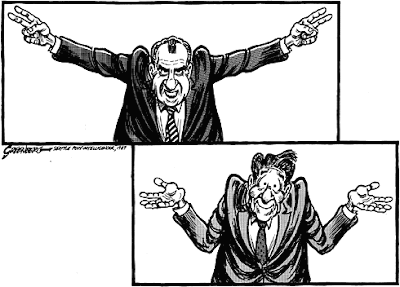Summary:
Collapse, ma non troppo!New IDEAS Working Paper on the alternative views of the collapse of Bretton Woods. From the abstract:Contrary to conventional views which suggest that the collapse of Bretton Woods represented the beginning of the end of the global hegemonic position of the dollar, the collapse of the system liberated American policy from convertibility to gold, and imposed a global fiat system still dominated by the floating dollar. The end of Bretton Woods and the set of regulations that imposed capital controls were part of the agenda of many powerful groups within the US, and led to the creation of a more dollarized world. The challenge to the dollar might arise, eventually, from the decline in the United States’power to determine the pricing of key commodities in global
Topics:
Matias Vernengo considers the following as important: Bretton Woods, Dollar hegemony, power
This could be interesting, too:
Collapse, ma non troppo!New IDEAS Working Paper on the alternative views of the collapse of Bretton Woods. From the abstract:Contrary to conventional views which suggest that the collapse of Bretton Woods represented the beginning of the end of the global hegemonic position of the dollar, the collapse of the system liberated American policy from convertibility to gold, and imposed a global fiat system still dominated by the floating dollar. The end of Bretton Woods and the set of regulations that imposed capital controls were part of the agenda of many powerful groups within the US, and led to the creation of a more dollarized world. The challenge to the dollar might arise, eventually, from the decline in the United States’power to determine the pricing of key commodities in global
Topics:
Matias Vernengo considers the following as important: Bretton Woods, Dollar hegemony, power
This could be interesting, too:
Matias Vernengo writes Challenges and Perspectives of International Monetary Policy
Matias Vernengo writes Dollar dominance and the international monetary hierarchy
Matias Vernengo writes Dollar Hegemony and Argentina
Matias Vernengo writes Dollar Hegemony, coming soon
Collapse, ma non troppo!
New IDEAS Working Paper on the alternative views of the collapse of Bretton Woods. From the abstract:
Contrary to conventional views which suggest that the collapse of Bretton Woods represented the beginning of the end of the global hegemonic position of the dollar, the collapse of the system liberated American policy from convertibility to gold, and imposed a global fiat system still dominated by the floating dollar. The end of Bretton Woods and the set of regulations that imposed capital controls were part of the agenda of many powerful groups within the US, and led to the creation of a more dollarized world. The challenge to the dollar might arise, eventually, from the decline in the United States’power to determine the pricing of key commodities in global markets; but it is premature to think about the demise of the dollar. The limitations of the dominant views about Bretton Woods are ultimately tied to mainstream economics.Read it here.

